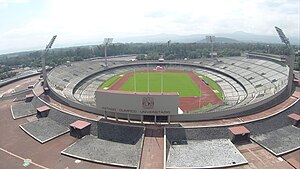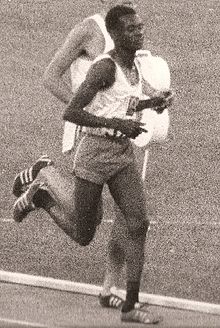1968 Summer Olympics / Athletics - 10,000 m (men)
|
|
|||||||||

|
|||||||||
| sport | athletics | ||||||||
| discipline | 10,000 meter run | ||||||||
| gender | Men | ||||||||
| Attendees | 37 athletes from 23 countries | ||||||||
| Competition location | Estadio Olímpico Universitario | ||||||||
| Competition phase | October 13, 1968 | ||||||||
|
|||||||||
The men's 10,000-meter run at the 1968 Olympic Games in Mexico City was held on October 13, 1968 in the Estadio Olímpico Universitario . The competition was the first athletics decision of these games. 37 athletes took part.
Olympic champion was the Kenyan Naftali Temu . He won ahead of the Ethiopian Mamo Wolde and the Tunisian Mohamed Gammoudi .
For the Federal Republic of Germany - officially Germany - Manfred Letzerich (18th place) and Lutz Philipp (23rd place) started. For the GDR - officially East Germany - Jürgen Haase competed (15th place).
Runners from Switzerland, Austria and Liechtenstein did not take part.
Existing records
| World record | 27: 39.4 min |
Ron Clarke ( Australia )
|
Oslo , Norway | July 14, 1965 |
| Olympic record | 28: 24.4 min |
Billy Mills ( USA )
|
Tokyo 10,000 meter race , Japan | October 14, 1964 |
Conducting the competition
The athletes competed on October 13 at 5:00 p.m. ( UTC −6). There were no qualification runs.
Result
Date: October 14, 1968, 5 p.m.
Much had been said in advance regarding the long-distance races about the possible influence of the mountain air in Mexico and its influence on the outcome of the race was speculated. Among the favorites was of course the Australian world record holder Ron Clarke, who led the world rankings by a clear margin, but had problems with the final sprint at major races. The European champion from 1966 , Jürgen Haase from the GDR, was also highly regarded. One of the medal candidates was above all the Kenyan Kipchoge Keino.
As expected, the race was approached slowly, the starting field remained close together in the first half of the race. The leadership work was done mainly by the Soviet athlete Nikolai Swiridow as well as local hero Juan Martínez and the Colombian Álvaro Mejía. After the 5000 meter mark, the field gradually widened. More and more runners fell back from the front group. At the 8000 meter mark, the pace was slowly increased and on the last thousand meters it got really fast. With two laps to go, four athletes were still fighting for the medals: the 1964 silver medalist Mohamed Gammoudi from Tunisia, Ron Clarke, the Ethiopian Mamo Wolde and the Kenyan Naftali Temu, winner of the 1966 Commonwealth Games . Temu and Wolde increased the pace strongly, Clarke fell back significantly and Gammoudi now also lost contact with the two. Wolde took the lead, Temu stayed in his slipstream. On the home stretch, Naftali Temu passed Mamo Wolde and became Olympic champion. Mohamed Gammoudi secured the bronze medal, while Clarke, completely exhausted, was caught by Juan Martínez and Nikolai Swiridow. Clarke collapsed after the finish line and received medical attention from an Australian doctor.
Naftali Temu was the first Olympic champion in Kenya.
Mamo Wolde won the first Ethiopian medal in this discipline.
Alifu Massaquoi was the first Sierra Leone athlete to take part in the Olympic Games.
It was the first time that black African runners had such dominance at the Olympics. The experts speculated whether this was due to Mexico's low-oxygen air or whether the athletes from this part of the world were simply getting better and better. Future developments should show that Africa’s runners should actually be among the world's top runners in large numbers and in some cases be very dominant.
| Split times | |||
|---|---|---|---|
| Intermediate mark |
Meanwhile | Leading | 1000 m time |
| 1000 m | 2: 58.5 min | János Szerényi | 2: 58.5 min |
| 2000 m | 5: 57.4 min | Nikolai Sviridov | 2: 58.9 min |
| 3000 m | 8: 56.1 min | Nikolai Sviridov | 2: 58.7 min |
| 4000 m | 11: 54.8 min | Nikolai Sviridov | 2: 58.7 min |
| 5000 m | 14: 55.0 min | Wohib Masresha | 3: 00.2 min |
| 6000 m | 17: 58.6 min | Juan Martínez | 3: 03.6 min |
| 7000 m | 20: 57.1 min | Juan Martínez | 2: 58.5 min |
| 8000 m | 23: 57.7 min | Ron Hill | 3: 00.6 min |
| 9000 m | 26: 51.1 min | Mamo Wolde | 2: 53.4 min |
| 10,000 m | 29: 27.4 min | Naftali Temu | 2: 36.3 min |
literature
- Ekkehard zur Megede , The History of Olympic Athletics, Volume 2: 1948–1968, Verlag Bartels & Wernitz KG, Berlin, 1st edition 1969, p. 346f
Video
- 10,000m Final, 1968 Olympic Games, Mexico City , posted December 19, 2012 on youtube.com, accessed November 5, 2017
Web links
- SportsReference 10,000m , accessed November 5, 2017
- Official report - summary p. 67f., English / French. (PDF), accessed on November 5, 2017
- Official report of the Olympic Games 1968 p. 523, English / French. (PDF), accessed on November 5, 2017
Individual evidence
- ↑ IAAF Statistics Handbook, Berlin 2009 Page 551 (Engl.) ( Memento of 29 June 2011 at the Internet Archive ), accessed on November 5, 2017
- ↑ Official report of the 1968 Olympic Games ( Memento of the original from September 17, 2018 in the Internet Archive ) Info: The archive link has been inserted automatically and has not yet been checked. Please check the original and archive link according to the instructions and then remove this notice. P. 10, English / French (PDF), accessed on November 5, 2017
- ↑ Official report of the 1968 Olympic Games ( Memento of the original from September 17, 2018 in the Internet Archive ) Info: The archive link has been inserted automatically and has not yet been checked. Please check the original and archive link according to the instructions and then remove this notice. P. 523, engl./frz. (PDF), accessed on November 5, 2017
- ↑ SportsReference , accessed November 5, 2017
